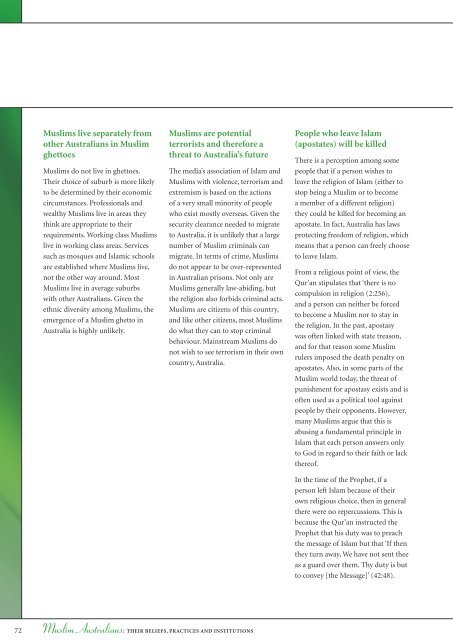Muslim Australians - Religion Cultural Diversity Resource Manual
http://www.islamicglobe.com
http://www.islamicglobe.com
Create successful ePaper yourself
Turn your PDF publications into a flip-book with our unique Google optimized e-Paper software.
<strong>Muslim</strong>s live separately from<br />
other <strong>Australians</strong> in <strong>Muslim</strong><br />
ghettoes<br />
<strong>Muslim</strong>s do not live in ghettoes.<br />
Their choice of suburb is more likely<br />
to be determined by their economic<br />
circumstances. Professionals and<br />
wealthy <strong>Muslim</strong>s live in areas they<br />
think are appropriate to their<br />
requirements. Working class <strong>Muslim</strong>s<br />
live in working class areas. Services<br />
such as mosques and Islamic schools<br />
are established where <strong>Muslim</strong>s live,<br />
not the other way around. Most<br />
<strong>Muslim</strong>s live in average suburbs<br />
with other <strong>Australians</strong>. Given the<br />
ethnic diversity among <strong>Muslim</strong>s, the<br />
emergence of a <strong>Muslim</strong> ghetto in<br />
Australia is highly unlikely.<br />
<strong>Muslim</strong>s are potential<br />
terrorists and therefore a<br />
threat to Australia’s future<br />
The media’s association of Islam and<br />
<strong>Muslim</strong>s with violence, terrorism and<br />
extremism is based on the actions<br />
of a very small minority of people<br />
who exist mostly overseas. Given the<br />
security clearance needed to migrate<br />
to Australia, it is unlikely that a large<br />
number of <strong>Muslim</strong> criminals can<br />
migrate. In terms of crime, <strong>Muslim</strong>s<br />
do not appear to be over-represented<br />
in Australian prisons. Not only are<br />
<strong>Muslim</strong>s generally law-abiding, but<br />
the religion also forbids criminal acts.<br />
<strong>Muslim</strong>s are citizens of this country,<br />
and like other citizens, most <strong>Muslim</strong>s<br />
do what they can to stop criminal<br />
behaviour. Mainstream <strong>Muslim</strong>s do<br />
not wish to see terrorism in their own<br />
country, Australia.<br />
People who leave Islam<br />
(apostates) will be killed<br />
There is a perception among some<br />
people that if a person wishes to<br />
leave the religion of Islam (either to<br />
stop being a <strong>Muslim</strong> or to become<br />
a member of a different religion)<br />
they could be killed for becoming an<br />
apostate. In fact, Australia has laws<br />
protecting freedom of religion, which<br />
means that a person can freely choose<br />
to leave Islam.<br />
From a religious point of view, the<br />
Qur’an stipulates that ‘there is no<br />
compulsion in religion (2:256),<br />
and a person can neither be forced<br />
to become a <strong>Muslim</strong> nor to stay in<br />
the religion. In the past, apostasy<br />
was often linked with state treason,<br />
and for that reason some <strong>Muslim</strong><br />
rulers imposed the death penalty on<br />
apostates. Also, in some parts of the<br />
<strong>Muslim</strong> world today, the threat of<br />
punishment for apostasy exists and is<br />
often used as a political tool against<br />
people by their opponents. However,<br />
many <strong>Muslim</strong>s argue that this is<br />
abusing a fundamental principle in<br />
Islam that each person answers only<br />
to God in regard to their faith or lack<br />
thereof.<br />
In the time of the Prophet, if a<br />
person left Islam because of their<br />
own religious choice, then in general<br />
there were no repercussions. This is<br />
because the Qur’an instructed the<br />
Prophet that his duty was to preach<br />
the message of Islam but that ‘If then<br />
they turn away, We have not sent thee<br />
as a guard over them. Thy duty is but<br />
to convey [the Message]’ (42:48).<br />
72 <strong>Muslim</strong> <strong>Australians</strong>:THEIR BELIEFS, PRACTICES AND INSTITUTIONS














